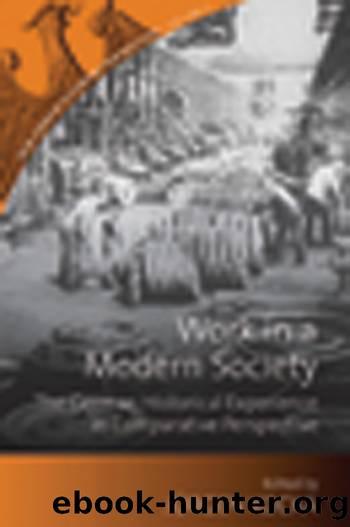Work in a Modern Society by Jurgen Kocka

Author:Jurgen Kocka
Language: eng
Format: epub
Publisher: Berghahn Books
7
Soldiering and Working: Almost the Same? Reviewing Practices in Industry and the Military in Twentieth-Century Contexts
Alf Lüdtke
A Colonial Moment
The infantry fired steadily and stolidly, without hurry or excitement, for the enemy were far away and the officers careful. Besides, the soldiers were interested in the work and took great pains. But presently the mere physical act became tedious. The tiny figures seen over the slide of the back-sight seemed a little larger but also fewer at each successive volley. The rifles grew hot â so hot that they had to be changed for those of the reserve companies. The Maxim guns exhausted all the water in their jackets, and several had to be refreshed from the water-bottles of the Cameron Highlanders before they could go on with their deadly work. The empty cartridge-cases, tinkling to the ground, formed small but growing heaps beside each man. And all the time out on the plain on the other side bullets were shearing through flesh, smashing and splintering bones; blood spouted from terrible wounds; valiant men were struggling on through a hell of whistling metal, exploding shells, and spurting dust â suffering, despairing, dying.1
A young gentleman and trained cavalry officer drafted this report several weeks after having witnessed this action of British troops in Sudan in 1898. The author was Winston S. Churchill, who participated in one of these colonial wars. In his account, Churchill once again makes visible to the wider public what had never vanished from colonial and imperial politics: the physical annihilation of those who did not bend to the various âcivilizing missionsâ of the agents of the West.
The soldiers Churchill observed at their âworkâ were professionally trained âsix-year-old British soldiersâ.2 In his view, they fundamentally differed from those âboysâ or âconscriptsâ who would follow âtheir officers in blind ignoranceâ and march âin a row to their deathâ as they staffed the armies on the European continent. With these British troops, however, âevery man was an intelligent human being who thought for himself, acted for himself, took pride in himself and knew his own mindâ. Thus, âspontaneity, not mere passive obedience, was the characteristic of their chargeâ. These soldiers had undergone intensive training on the exercise grounds at home, and most of them had served at various locations in the empire. Churchill therefore saw himself as a witness to the actions of a well-trained body of seasoned experts whose conduct emphasized keeping cool. In this way, the men would stay in control of themselves and of their tools and could continue to cooperate with both comrades and superiors.
Download
This site does not store any files on its server. We only index and link to content provided by other sites. Please contact the content providers to delete copyright contents if any and email us, we'll remove relevant links or contents immediately.
The Vikings: Conquering England, France, and Ireland by Wernick Robert(84229)
Ali Pasha, Lion of Ioannina by Eugenia Russell & Eugenia Russell(40256)
The Conquerors (The Winning of America Series Book 3) by Eckert Allan W(37473)
The Vikings: Discoverers of a New World by Wernick Robert(36978)
Cecilia; Or, Memoirs of an Heiress — Volume 1 by Fanny Burney(32558)
Cecilia; Or, Memoirs of an Heiress — Volume 2 by Fanny Burney(31956)
Cecilia; Or, Memoirs of an Heiress — Volume 3 by Fanny Burney(31942)
Empire of the Sikhs by Patwant Singh(23086)
The Secret History by Donna Tartt(19088)
Hans Sturm: A Soldier's Odyssey on the Eastern Front by Gordon Williamson(18592)
Cat's cradle by Kurt Vonnegut(15355)
Pimp by Iceberg Slim(14507)
Sapiens: A Brief History of Humankind by Yuval Noah Harari(14389)
Talking to Strangers by Malcolm Gladwell(13370)
Norse Mythology by Gaiman Neil(13365)
Leonardo da Vinci by Walter Isaacson(13336)
4 3 2 1: A Novel by Paul Auster(12392)
Underground: A Human History of the Worlds Beneath Our Feet by Will Hunt(12098)
The Radium Girls by Kate Moore(12028)
